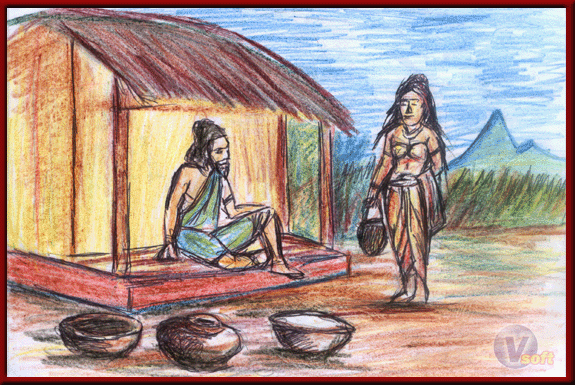216. The Bodhisatta And The Queen

Once upon a time when Brahmadatta was reigning in Benares, the Bodhisatta was his minister, rendering him all due service. One day the king saw his son, who acted as his viceroy, coming to pay his respects to him, he thought to himself, “This fellow may do me wrong, if he gets an opportunity.” So he said, “As long as I live, you cannot live in this city. Live somewhere else, and at my death come and rule the kingdom.” He agreed to these conditions, and bidding his father farewell he started from Benares with his chief wife. On coming to a village, he built himself a hut of leaves in a wood and stayed there, supporting life on wild roots and fruit. By and bye the king died. The young viceroy, from his observation of the stars, knew of his father’s death, and as he was traveling to Benares; on the way there was a mountain. His wife said to him, “Sir! Supposing if this mountain turns into pure gold, would you give me some of it?”
He cried, “Who are you? I would not give you an atom.” She thought: “Out of my love for him I entered this forest, not having the heart to desert him, and he speaks to me thus. He is very hard-hearted, and of he becomes king, what good will he do me?”
On reaching Benares he was established on the throne and raised her to the dignity of chief queen. He merely gave her titular rank, but beyond this he paid her no respect of honour, and did not even recognize her existence. Thought the Bodhisatta, “This queen was helpmeet to the king, not counting the pain, and lived with him in the wilderness. But he, taking no count of this, goes about, taking his pleasure with other women. But I will bring it about that she shall receive lordship over all.”
And with this thought he went one day and said, “Lady! we do not receive from you so much as a lump of rice. Why are you so hard-hearted, and why do you thus neglect us?” She replied, “if I myself were to receive that, I would give it you, but if I get nothing, what am I to give?”
He answered, “What? Is the king likely to give gold, would you give me anything? Who are you? I would give you nothing.”
He asked, “Well! could you repeat all this before the king?”
She said, “Agreed!” So the Bodhisatta, when he stood and paid his respects to the king, asked the queen, saying, “Are we not, lady, to receive aught at your hands?” She answered, “Sir! when I get anything, I will give you something. But, what is the king likely to give me now? When we were coming from the forest, and a mountain came into sight, I asked him, “If yonder mountain were all pure gold, would you give me some of it?’ ‘Who are you?’ he said, “I will give you nothing.’ And in these words he refused what it was easy to give you nothing.’ And in these words he refused what it was easy to give.”
The king on hearing this uttered the second stanza:
When you can. Say “Yes, I will,”
When you cannot, promise nil,
Broken promises are lies;
Liars all wise men despise.
The queen, when she heard this, raising her joined hands in respectful salutation, repeated the third stanza:
Standing fast in righteousness,
Thee, O prince, we humbly bless.
Fortune may all else destroy;
Truth is still thy only joy.
The Bodhisatta, after hearing the queen sing the praises of the king, set forth her virtues and repeated the fourth stanza:
Known to fame as peerless wife,
Sharing weal and woe of life,
Equal she to either fate,
Fit with even kings to mate.
The Bodhisatta in these words sang the praises of the queen, saying, “This lady, your majesty, in the time of your adversity, lived with you and shared your sorrows in the forest. You ought to honour her.” The king, at his words, called to mind the queen’s virtues and said,” Wise Sir! at your words I am reminded of the queen’s virtues.” And so saying he gave all power into her hand, moreover he bestowed great power upon the Bodhisatta. “For it was by you,” he said, “I was reminded of the queen’s virtues.”
The Master, having ended his lesson, revealed the Truths and identified the Birth: – At the conclusion of the Truths, the husband and wife attained to fruition of the First Path: – “At that time this landowner was the king of Benares, this lay sister was the queen, and I myself was the wise councilor.”


Leave a Reply